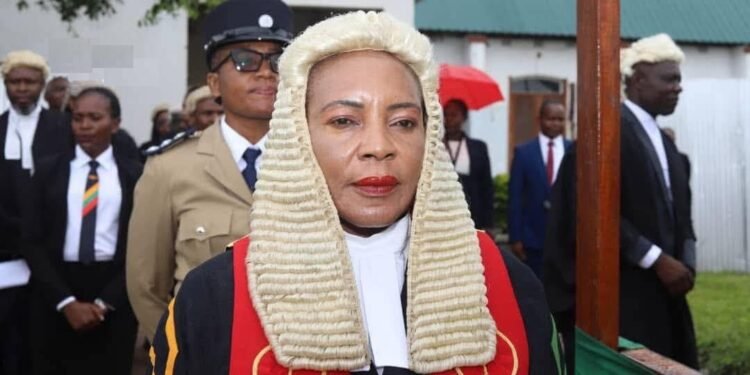A rogue gavel: The Speaker’s ruling defies the Constitution
By
Prof. Cephas Lumina
Parliament’s top official is undermining the authority of the judiciary and the rule of law – it’s time to hold her accountable. When the Speaker of the National Assembly refuses to uphold a Constitutional Court ruling, she violates her oath – and puts the country’s democracy at risk.
In an astounding display of constitutional defiance, the Speaker of the National Assembly of Zambia, Nelly Mutti, has issued a ruling that not only challenges the authority of the Constitutional Court, but also raises concerns about the delicate balance of powers essential to any democratic society. Her response to the point of order raised on 1 July 2025 by Hon. Mubita Anakoka, MP for Luena, must be seen for what it truly is: a dangerous misinterpretation of legal principles, a direct challenge to constitutional supremacy, a misguided attempt to overturn the Court judgment disguised as a ruling on a point of order, and a potential trigger for a constitutional crisis.
At the heart of the matter is the Constitutional Court’s ruling in Munir Zulu and Another v Attorney-General, which declared the entire process leading to the drafting of Constitution of Zambia (Amendment) Bill No. 7 of 2025 unconstitutional. The Court found that the government had violated key constitutional principles, including the requirement for broad public participation, and ordered a restart of the process under a technical committee of experts.
But instead of upholding the decision of the apex constitutional court, the Speaker essentially proclaimed that the National Assembly is not bound by the judgment because it enjoys “far-reaching freedom to determine and regulate its internal procedures and proceedings” free from interference by “any external body, including the courts of law.” She, in effect, accused the Court of flouting the doctrine of exclusive cognisance – a doctrine rooted in parliamentary sovereignty.
This was no mere legal interpretation. It was a profound and dangerous misunderstanding of constitutional law. And it is a blatant subversion of the Constitution and a betrayal of the Speaker’s solemn oath of office.
The Doctrine of Exclusive Cognisance – Misapplied and Misused
The Speaker invoked the common law doctrine of exclusive cognisance, inherited from British parliamentary practice, and designed to protect the internal workings of Parliament from outside interference. This doctrine ensures that courts do not interfere with the day-to-day functioning of Parliament, such as debates, voting procedures, or internal discipline. But this doctrine is not a licence for lawlessness. In a constitutional democracy like Zambia, where the Constitution is the supreme law, this doctrine does not immunize Parliament from constitutional constraints or from review by the courts when it oversteps its bounds. Parliament cannot invoke privilege to shield itself from compliance with constitutional requirements, especially when making constitutional amendments that require specific procedural and participatory standards.
Even in the United Kingdom, where parliamentary sovereignty reigns supreme, courts have recognized that constitutional principles and the rule of law limit the powers of Parliament. In the case of R (on the application of Miller) v The Prime Minister [2019], the UK Supreme Court emphasized that constitutional boundaries cannot be ignored, ruling that the Prime Minister’s advice to the monarch to prorogue Parliament was subject to judicial review because it undermined constitutional principles like parliamentary accountability.
In South Africa, which has a constitutional framework like Zambia’s, the Constitutional Court has consistently emphasized that Parliament is not above the Constitution. In the case of Economic Freedom Fighters v Speaker of the National Assembly and Others [2016], the Court found that Parliament’s failure to hold the executive accountable was unconstitutional, reinforcing that all state organs are equally subject to constitutional obligations.
The Speaker’s attempt to elevate parliamentary autonomy above constitutional scrutiny would be legally laughable if it were not so dangerously misguided. Her reliance on exclusive cognisance is nothing more than a smokescreen – an attempt to shield politically motivated legislative overreach from judicial scrutiny.
Constitutional Supremacy Is Non-Negotiable
The Constitution of Zambia explicitly establishes the principle of constitutional supremacy. Article 1(2) states: “This Constitution is the supreme law of the Republic of Zambia and any other written law, customary law and customary practice that is inconsistent with its provisions is void to the extent of the inconsistency.” The Constitution also specifies that “[a]n act or omission that contravenes (the) Constitution is illegal,” that the Constitution binds “all persons in Zambia, State organs and State institutions” and that a matter relating to the Constitution “shall be heard by the Constitutional Court.”
The Speaker’s ruling essentially asserts that Parliament can act outside the bounds of the Constitution as long as it considers its actions to be “internal.” This is an incredibly unconstitutional claim that, if left unchallenged, would allow Parliament to create laws without regard to constitutional prescripts, procedural fairness, public participation, or judicial oversight.
The Speaker, who notably holds the title of State Counsel, should be held to a higher standard. Her misinterpretation is not simply an academic error; it is a political decision with serious constitutional implications. By attempting to shield Parliament from constitutional scrutiny, she has elevated it above the Constitution – a position that is untenable in a constitutional democracy.
The Speaker’s Oath – Broken
Upon taking office, the Speaker swore the following oath:
“I, [name], having been appointed Speaker of the National Assembly do swear/affirm that I will and diligently discharge my duties and perform my functions in the office of the Speaker of the National Assembly …”
This is not a mere formality. It is a binding legal and moral commitment to uphold the Constitution, not personal ideology, party loyalty, or political expediency, particularly in light of the constitutional provisions stating that the legislative authority of the Republic comes from the people of Zambia and must be exercised in a way that protects the Constitution and advances democratic governance (Article 61), and that the Speaker can be removed for, among other reasons, violating the Constitution (Article 83). By breaching this oath, the Speaker has shown herself unfit to hold that high office.
By purporting to place Parliament above the Constitutional Court, the Speaker has made a mockery of the supremacy clause of the Constitution. Her claim that the Constitutional Court cannot direct Parliament, even in cases of unconstitutional actions, is a distortion of the law, sets a dangerous precedent, and violates her constitutional responsibilities.
The Speaker is not a referee for one team. Her role is to uphold the rules and safeguard the integrity of Parliament, regardless of the party in power. The Zambian public expects and deserves a Speaker who acts with fairness and independence, especially when the Constitution is at risk.
Yet, her record has shown a pattern of partisan bias – stifling crucial discussions, shielding executive overreach, and now, defying the Constitutional Court to advance the ruling party’s agenda. Her behaviour raises doubts not only about her impartiality but also about the credibility of the National Assembly as an institution. Her partisan conduct strikes at the very heart of the constitutional order.
This most recent ruling, where she has, in effect, allowed Parliament to ignore a binding court decision on constitutional reform, represents the culmination of this bias. It is not only legally indefensible – it is politically toxic.
Time for Accountability
The Speaker’s conduct represents a clear act of constitutional defiance and a violation of the principle of separation of powers. This behaviour constitutes misconduct in the performance of a constitutional duty and provides solid grounds for impeachment. Her actions amount to a legislative veto of a court decision – something no democratic constitution permits. Her insistence on proceeding as if the Court’s decision does not exist is an act of contempt for the judiciary and the rule of law.
There is now a compelling case for the Speaker’s impeachment. Under Article 83 of the Constitution, the Speaker may be removed from office for gross misconduct or incapacity. The Constitution defines “gross misconduct” as including behaviour that “brings a public office into disrepute, ridicule or contempt,” or using or lending the prestige of an office to advance personal interests or the interests of another person. Misconduct also includes failing to uphold the Constitution, violating the oath of office, obstructing the enforcement of court decisions, and undermining the separation of powers. The Speaker’s actions tick all these boxes.
Moreover, the Speaker holds the prestigious title of State Counsel, the highest recognition in the Zambian legal profession. But with honour comes accountability. Her actions not only violate the Constitution but also breach the ethical obligations of a legal practitioner. The Law Association of Zambia (LAZ) should immediately investigate her conduct for professional misconduct and take disciplinary measures. She has brought the legal profession into disrepute. A lawyer who disregards constitutional rulings, especially from the highest court, should not retain the title of State Counsel. LAZ should also call for her disbarment if she continues to defy the law.
This is not a matter of political disagreements or differing legal interpretations. It is about constitutional fidelity. By refusing to recognise the authority of the Constitutional Court – the ultimate arbiter of constitutional matters – the Speaker has essentially declared Parliament to be above the law. This stance is incompatible with her office, and incompatible with democracy and constitutionalism.
Furthermore, civil society and the Zambian public must demand that Parliament – and the government – immediately adhere to the Constitutional Court’s decision. Allowing this defiance to go unchallenged would undermine public trust in the judiciary and set the stage for parliamentary authoritarianism.
Conclusion: No Institution Is Above the Law – and Parliament Must Not Become a Rogue Institution
Zambia’s democracy is facing a critical moment. If the Speaker’s ruling is allowed to go unchallenged, it would mean that Parliament can override court decisions, that the Constitution’s supremacy is conditional, and that separation of powers is little more than a slogan.
This is not just a legal debate – it is a test of Zambia’s democratic resolve.
The doctrine of exclusive cognisance was never meant to be a weapon against the Constitution. It is time for all branches of government, including Parliament, to be reminded: the Constitution reigns supreme. No one, not even the Speaker of the National Assembly, is above it.

























